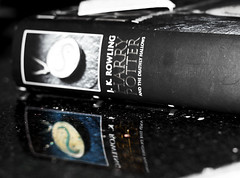Senh: This sounds like the content farm equivalent for e-books. It should be interesting to see where it goes. In the short term, it'll probably work. By using Google Trends and similar online analytical tools, they can create books that are more timely. The danger in that is if they get caught up in just cranking out "stuff." Then they'll turn into e-book spam. If that happens, Amazon and other distributors will start refining their searches for e-books to filter out "content farms" like Google.
E-book | featured news
Barnes & Noble's Finance Chief Quits
Senh: E-books are the wave of the future. Their e-reader, the Nook, has been successful. It is convenient when you can get a book to read within minutes. Physical books aren't dead yet, and I suspect that they'll still be a major source of their revenue for a few more years.







